Adviser: Trump Didn’t Want to ‘Dignify’ Neo-Nazis by Naming Them
The president remains hesitant to condemn the white nationalists who back him, even after the Charlottesville attack.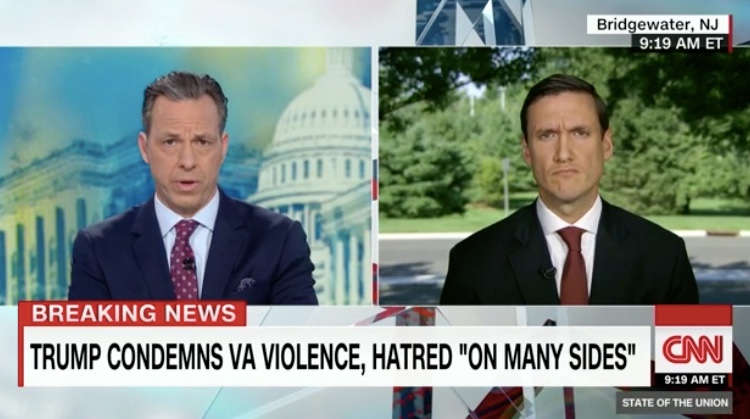 White House adviser Tom Bossert, right, discusses with CNN's Jake Tapper how President Trump responded to Saturday's violence in Charlottesville, Va. (CNN)
White House adviser Tom Bossert, right, discusses with CNN's Jake Tapper how President Trump responded to Saturday's violence in Charlottesville, Va. (CNN)
White House homeland security adviser Tom Bossert on Sunday discussed the widespread criticism levied at President Trump for his remarks in the hours after Saturday’s march of white nationalists in Charlottesville, Va. The president called for an end to “hatred, bigotry, and violence,” which he attributed to “many sides,” failing to explicitly condemn the violence of the white supremacists, neo-Nazis and members of the “alt-right” who marched.
Bossert attempted to defend the president, saying in an interview that aired Sunday on CNN’s “State of the Union” that Trump “condemned the violence and stood up at a time and a moment when calm was necessary and didn’t dignify the names of these groups of people but rather addressed the fundamental issue.” Bossert also dismissed suggestions that the vagueness of the president’s speech would embolden white supremacist groups, even after CNN host Jake Tapper read quotes from a neo-Nazi website praising Trump for expressing “no condemnation at all” of white nationalists and calling the president’s statement on Charlottesville “really, really good.”
Providing contrast to administration members like Bossert, some prominent Republicans have spoken out against Trump’s response. Sen. Cory Gardner, R-Colo., on Saturday tweeted: “Mr. President—we must call evil by its name. These were white supremacists and this was domestic terrorism.”
The Denver Post adds:
Shortly after Gardner’s tweets, U.S. Sen. Marco Rubio, a prominent Republican from Florida who lost when he ran against Trump during the 2016 primaries for president, also called on the president to do more to condemn white nationalists.
“Very important for the nation to hear @potus describe events in #Charlottesville for what they are, a terror attack by #whitesupremacists,” Rubio tweeted.
Other national Republicans joined in calling on more condemnation of the white nationalists. U.S. Sen. Orrin Hatch, Republican from Utah, in a tweet stated: “We should call evil by its name. My brother didn’t give his life fighting Hitler for Nazi ideas to go unchallenged here at home.”
Why would such an outspoken president hesitate to call out an act of domestic terrorism? Trump was critical of President Obama for stopping short of using the term “radical Islamic terrorists” but seems reluctant to apply the label of terrorism to violent acts by white supremacists, neo-Nazis and alt-right activists who count themselves among the president’s supporters. David Duke, an ex-KKK chief, told Time in 2016 that “Donald Trump is talking implicitly. I’m talking explicitly.” The president’s kid-glove treatment of his explicitly racist supporters would seem to support Duke’s theory.
The New York Times added historical context to the controversy, pointing out that this was not the first time Trump has balked at denouncing white supremacy:
When he retweeted white supremacists’ accounts [during the presidential election campaign], he brushed aside questions about them. When he was asked about the support he had been given by David Duke, a former Ku Klux Klan leader, he chafed, insisting he didn’t know Mr. Duke.
Finally, at a news conference in South Carolina, Mr. Trump said “I disavow” when pressed on Mr. Duke. He later described Mr. Duke as a “bad person.”
When his social media director, Dan Scavino, posted an image on Mr. Trump’s Twitter feed with a Star of David near Hillary Clinton’s head, with money raining down, Mr. Trump rejected widespread criticism of the image as anti-Semitic. And after years of questioning President Barack Obama’s citizenship, he blamed others for raising the issue in the first place.
After the president’s comments caused blowback this weekend, The Associated Press relayed word on Sunday that the White House released a statement saying the president “very strongly” condemns individual hate groups such as “white supremacists, KKK and neo-Nazis,” and that he denounces “all forms of violence, bigotry and hatred.”
Watch Tapper’s interview with Bossert below (via CNN):
Your support matters…
Independent journalism is under threat and overshadowed by heavily funded mainstream media.
You can help level the playing field. Become a member.
Your tax-deductible contribution keeps us digging beneath the headlines to give you thought-provoking, investigative reporting and analysis that unearths what's really happening- without compromise.
Give today to support our courageous, independent journalists.
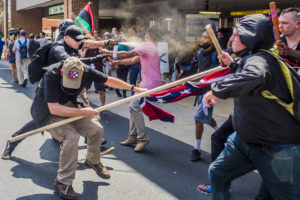
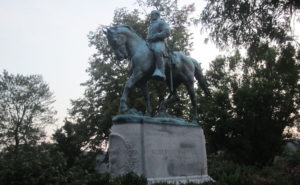
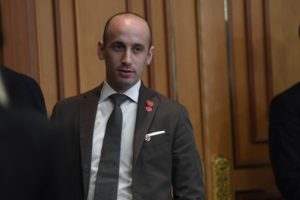
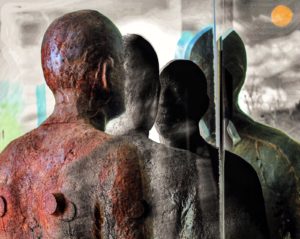
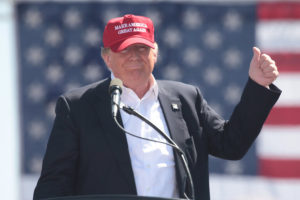

You need to be a supporter to comment.
There are currently no responses to this article.
Be the first to respond.